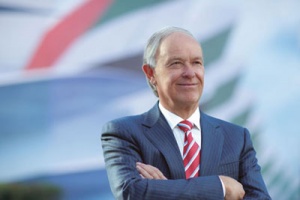Emirates offers detailed rebuttal to US airline accusations
 Emirates president Tim Clark put the case to American officials
Emirates president Tim Clark put the case to American officials Emirates has released a point-by-point, fact-based response to allegations of subsidy and unfair competition levelled by the “big three” US legacy carriers - Delta, United and American Airlines.
The document was released following meetings where an Emirates delegation briefed officials from the US Departments of state, transportation, and commerce on the airline’s response.
The US legacy carriers launched an aggressive lobbying campaign in January.
Tim Clark, president, Emirates Airline said: “The methods employed by the US legacy carriers to discredit Emirates have been surprising and frankly, repugnant.
“We do not underestimate their lobbying prowess, but facts are facts.
ADVERTISEMENT
“Unlike their white paper, which is riddled with inaccuracies, conjecture, and legal misinterpretations, Emirates’ response is comprehensive and based on hard facts.
“We clearly show why they have no grounds to ask the US government to unilaterally freeze Emirates’ operations to the USA or pursue other action under the Open Skies agreement.
“It is because we are absolutely not subsidised, and our operations do not harm these legacy carriers, but instead benefit consumers, communities and America’s national economy.”
Emirates’ response seeks to systematically disproves each of the big three’s allegations that it has received over $6 billion in subsidies, including fuel hedging subsidies; purchasing goods and services from related third parties at below-market terms; disproportionately benefiting from airport infrastructure and user fee at Dubai International airport; and having an artificial cost advantage through the structure of the UAE’s labour law.
Clark said: “The subsidy allegations put forward by the big three are patently false.
“We have been profitable for 27 years straight, and unlike our accusers, we have never depended on government bail-outs or protection from competition.
“In fact, we were told right from the start by the government of Dubai that Emirates has to deliver profits and stand on its own feet.
“We had to then, and we still have to now.
“Dubai has no oil reserves to speak of, and therefore it embarked on a well-documented strategy to diversify its economy with air transport as a key enabler.
“That directive is what led us to pioneer a successful business model as an efficient long-haul connector that offers customers a best-in-class experience.
“Our global expansion is funded from our own cash flow, and debt raised in the open market through banks and financial institutions.
“Our success is due to superior commercial performance.
“To date we have paid our shareholder, the Dubai government, more than $3 billion in dividends.
“All of this is laid out in our financials, audited by Pricewaterhouse Coopers.
“We are financially transparent, and have published fully audited accounts for over 20 years.”
Much of the case against Emirates rests on the legal premise that the WTO’s anti-subsidy rules apply to international aviation or is implicitly incorporated in the US Open Skies Agreements.
This is fundamentally wrong, argues Emirates.
The WTO Agreement on Subsidies and Countervailing Measures does not apply to services, which are covered by a separate WTO Agreement, the General Agreement on Trade in Services.
GATS explicitly excludes air transport services, and does not include rules on unfair subsidies.
Clark continued: “It is ironic the big three are trying to argue their case based on WTO rules, when the USA, at the behest of these same legacy carriers, has always opposed efforts to bring air transport into GATS.
“Part of that reason would be because the US carriers themselves would be a prime target for restrictions, and would for the first time have to compete with foreign carriers in their protected US domestic market.
“Even if WTO rules applied – which they don’t - the legacy carriers would have to show that Emirates was subsidized and that competitive injury resulted, and they have failed to do this.”
The big three have also sought build their case for a unilateral freeze on Article 11 of the Open Skies Agreement, but this is the wrong article, said Emirates.
Article 11 deals with access.
Subsidies are addressed in Article 12 which sets out specific procedures for dealing with artificially low prices “due to direct or indirect governmental subsidy or support”.
In addition, both Articles 11 and 12 prohibit unilateral actions with very limited exceptions that do not include subsidies.
Clark added: “By asking the US government to take unilateral action, the big three are asking the US to breach its own negotiated international obligations.
“This would put in jeopardy America’s Open Skies relationships with 113 other countries, and all the significant public and competition benefits that the Open Skies program has generated.
“The US legacy carriers have framed their complaint in terms of their own narrow interests.
“They assert fealty to the “foundational principles” of Open Skies but the reality is they favour Open Skies agreements only when such work to their financial advantage, and they seek to lock out airlines that offer consumers a competitive choice.”
Emirates seeks to contribute to the goals of Open Skies which are: greater competition, increased flight frequency, consumer choice, promotion of business travel and tourism, improved service, and customer-centric innovation.
Clark concluded: “What’s happening is that the legacy carriers, not satisfied with their protected domestic market, plus their anti-trust immunised global alliances which let them collude on capacity and price with joint venture partners, are now flexing their lobbying muscle to further restrict valuable international air transport links for American consumers, communities and companies.
“The case put forward by Delta, United and American Airlines against Emirates is full of holes, and if their protectionist campaign were to be successful, it will not end with just the Gulf airlines.”

